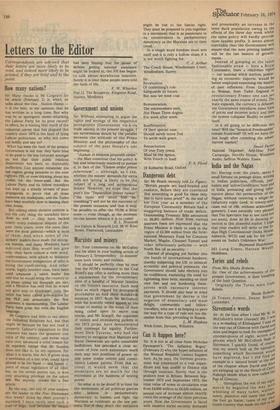How many nations?
Sir: Many thanks to Mr Cosgrave for his article (February 2) in which he talks about the One Nation theme — it is the best, in my opinion, that he has written in a long time. But why was he so apologetic about attacking the Labour Party for its poor record? In effect, he is hinting that much of the industrial unrest that has plagued this country since 1970 is the fault of lying Labour politicians, so why not come out boldly and say so?
What has been the fault of the present Government is not that they have tried to do good to the less fortunate amongst us, but that their public relations department has been so deplorably ineffective. Can anyone remember the last regime giving pensions to the over eighties, F1S, or even thinking about tax credits for the lower-paid. But the Labour Party and its fellow travellers has kept up a steady stream of pure propaganda to prove that all these measures are inadequate, and the Tories have been woefully slow in beating their own drums.
But talking about divisive policies is not the only thing the socialists have done so well — they have backed nearly every industrial dispute of the past three years, even the ones that were the most political—which is most of them. And when some of the strikers' leaders have made the strongest threats, and many Ministers have indicated that they would not give way, they have coined a new word, confrontation, with which to belabour the Government irrespective of who is doing the confronting. And other words, highly emotive ones, have been used: whenever a union leader has said that he would bring the country to its knees unless his demands are met, and a Minister has said that he would not give way to blackmail, only the latter has been called provocative by the PLP and presumably the first statement is statesmanship. The Labour Party have great fun with the English language.
Mr Cosgrave had little to say about the Industrial Relations Act, but that might be because he has not read it properly. Labour's opposition to this measure has been the greatest con trick of the century, and never once have they advanced a solid reason for its rejection, except that Mr Scanlon does not like it. In my opinion, for what it is worth, this Act, if given even a semblance of a fair trial, could have proved to be the finest — and fairest — piece of social legislation of all time, but, as the writer points out, it was only attacking privilege on the union side. But anyway, thanks for a fine article.
By the way, did any of your readers see the leader in the New Statesman this week? Even by that journal's standard, I have rarely seen such a load of bilge. Just because Mr Heath had been hinting that the abuse of' strikers _getting national assistance might be looked at, the NS has begun to talk about workhouse masters. Surely it is time these people were told the facts of life.
F. W. Wharton
Flat 11, The Broadway, Kingston Road, Staines, Middlesex


































 Previous page
Previous page